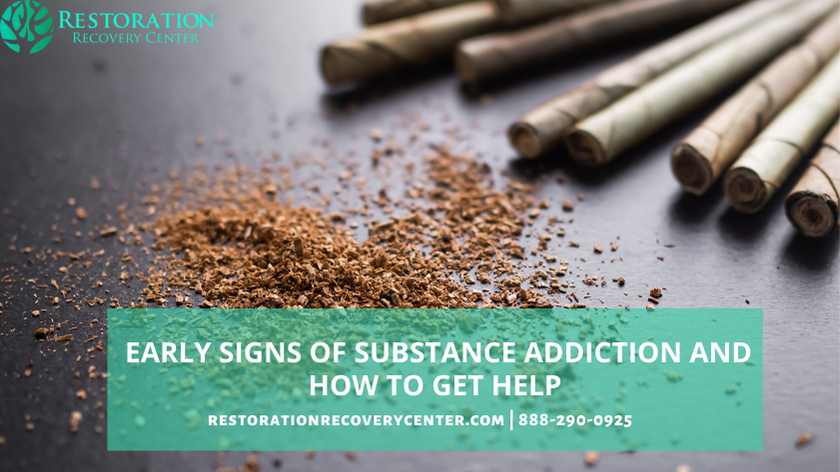Early Signs of Substance Addiction and How To Get Help
Addiction is a disorder that can lead to a series of harmful behaviors or conditions. If you are able to identify the early signs of substance addiction in good time, then you have better chances of getting the treatment you need to get your life back on track.
Identifying substance addiction
Addiction is diagnosed under a category referred to as “substance-related addictive disorders.”
The primary symptom of addiction is having a problem with the repetitive use of a substance, which often leads to a series of clinical impairments or distress.
The symptoms vary based on the addictive disorder of an individual.
An individual with an addiction problem will find themselves struggling to control their use of a particular substance. They will continue to use a substance regardless of the harm it might be inflicting on their health, even if the destructive nature of the substance is evident.
Repetitive craving for a substance can also be categorized as an addiction problem. Despite expressing a desire to quit the use of a substance, you will find that an individual is unable to stop using it.
The symptoms of addiction can vary from one person to the other, or from one substance to the other. The family history of an individual and their current circumstance also contributes to the extent of the addiction problem.
Psychological symptoms
Early signs of substance addiction that result in mental disorders exhibit the following traits.
– Inability to resist using the substance:
This is a case where there is a strong dependency on alcohol, meth, and other substances, where the addiction patient would have tried a few times to avoid the substance unsuccessfully. This might be a physiological problem because some substances, such as meth and heroin, can cause a chemical addiction problem, and if the patient attempts to stop using them, they will develop withdrawal symptoms.
Therefore the cycle of using and abusing these substances continues, despite harmful implications on the health of the victim. For example, smokers continue to smoke even after their lungs and heart is not functioning as they are supposed to.
– Using substance abuse as a stress-coping mechanism
A person with an addiction problem will turn to the substance for comfort or to relieve stress.
– Obsession
Obsession is where the patient will do anything literally to obtain the substance, including stealing money to get it. In most cases, these people always end up on the wrong side of the law.
– Taking risks
A patient exhibiting early signs of substance addiction can take a lot of risks to obtain the substance of abuse. Some would go to the extent of trading the substance for sex, or stealing, selling drugs, or becoming beggars to get money for the drugs. When they are under the influence of the substance, they might risk their lives, especially if they are allowed to drive or if they engage in violence.
– Overdosing in the initial stages:
This is a common mistake that people with alcohol use disorder always make. A person can consume large quantities of alcohol to get high quickly.
Physical symptoms
Using drugs and alcohol repeatedly can impact the normal functions of the body in several ways.
– Withdrawal symptoms:
If a person is used to a particular substance, they will experience some physical symptoms when the levels of the substance drop, depending on the substance in question. These symptoms can include cravings, diarrhea, trembling, constipation, seizures, or uncharacteristic behaviors such as violence.
– Changes in appetite:
Some substances will interfere with a person’s appetite. A substance like cocaine reduces the user’s appetite, while marijuana tends to increase the patient’s appetite.
– Organ damage or risk of other diseases:
Smoking substances such as tobacco or crack, can lead to irreversible respiratory conditions, including lung cancers and asthma. Injectable drugs, on the other hand, can cause a lot of damage to a person’s limbs or cause functionality problems to their arteries and veins, and at times, this can develop into a complication that can lead to the loss of a limb. Regular intake of alcohol, on the other hand, can lead to chronic liver complications.
– Sleeplessness:
Insomnia is one of the symptoms associated with withdrawal. Abusing illicit stimulants can disrupt the sleeping cycle of an individual. Craving the substance might also force an individual to stay up late to attend parties or go out in search of the drugs
– Changing of a person’s appearance:
If you are close to someone who is struggling with an addiction problem, you might begin to notice a change in their appearance. They begin to appear more tired, disheveled, and haggard, as using the drugs makes up the most parts of their day.
They have no time to attend to personal hygiene. If you notice any of the above symptoms in your loved one or in yourself, then it’s time to call California Addiction Treatment Center in Auburn. They will take you through counseling and ways to help your loved ones to overcome addiction.






